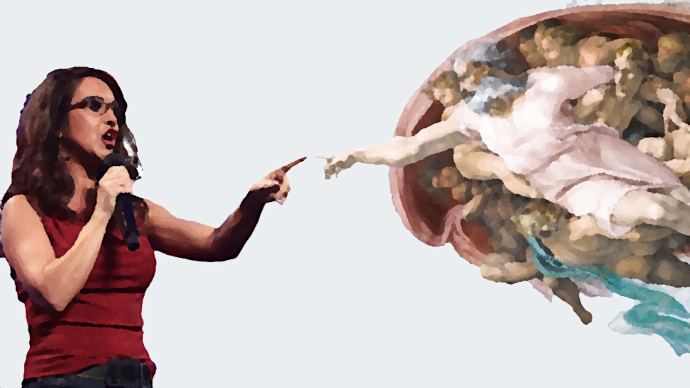The editor’s mashup of the works of Gage Skidmore and Michelangelo di Lodovico Buonarroti Simoni.
Intelligent Design: Defective Product
by W. E. Gutman
Unable to support their beliefs with empirical evidence, anti-Darwinists persist in injecting creationism into society’s collective psyche. They have since concocted a new slogan – “Intelligent Design” (ID) – the unverifiable assertion that the universe, the living beings that infect it, and the upheavals they endure are the work of an omniscient and omnipotent, though paranormal “noumena,” and not a freehand process such as natural selection (evolution) and the fortuitous effects of coincidence and unpredictability.
In public, ID advocates claim that they are looking for evidence of conscious design in nature, without considering the identity of the “designer.” Privately, however, they unambiguously insist on the idea that the designer is the Christian “God.” [Note the emphasis on Christian]. Forget the YAHWEH that the Jews invented nearly six thousand years before the Christian era and the Judeo-Christian deity that Muslims adopted and renamed Allah in the 6th century. Pushed to its incongruous extremes, ID might one day be called upon to quibble about things that fall from top to bottom not because gravity acts on them, but because a higher intelligence consciously and deliberately pushes them downward. Planes fall from the sky, they will say, buildings slump, and empires collapse because these events are predestined by an impenetrable force. They lack the intellectual flexibility to concede that technology cannot exist without the risk of accidents: The invention of the locomotive also contained the risk of derailment, the plane of a mechanical failure or human error, the stock market – of a crash. The vilest among them will claim that these misfortunes are in fact the result of divine revenge. A wide range of phenomena are attributed to ID: wars fought in the name of “God,” hunger, disease, earthquakes, cyclones and tsunamis.
Creationism presupposes two reciprocal attributes: the existence of a gifted (but unknowable) creator and an exceptional plan from which a useful and effective prototype can be rendered. Such a premise inevitably raises questions that, until now, ID has not been able or willing to answer. One can always quibble: “God” is outside of any human experience. Its existence is not obvious; it must be demonstrated. Thus arises the problem of its abstract existence, a dilemma that lies at the top of the philosophical effort and whose solution has a direct impact on the meaning and purpose of life. Believers insist: If “God” does not exist, then man becomes his own law and the norm of his own deeds; but if he exists, man must recognize his essential dependence on a creator, who is also his custodian, his legislator, and his judge, and before whom he is responsible for all his actions. His advent, some claim without going any further, was prima facie, obvious and primordial, ergo “God” was externalized in order to satisfy the need of men to fill a void.
~ ~
What “creator” fashions corruptible beings who kill for pleasure, reproduce shamelessly, cling to rival, inflexible, and absurd doctrines? Why do we suffer? Why are we defenseless against natural cataclysms that, according to ID, are unleashed against us for “mysterious reasons” by a capricious and unrecognizable supernatural force that owes us no explanation? What degree of intellect can be attributed to a “creator” who inflicts or tolerates atrocities for “the good that comes of them?” What cunning and irreducible energy orchestrates without apparent purpose – or turns a blind eye – to the paroxysms that convulse the universe? What abstract reasoning inspires an “almighty” who remains impassive before the sorrow and eternal suffering of men and beasts? How can such apathy be justified? What superior sapience grants itself virtues that men can never acquire and who claims to possess equal doses of benevolence and resentment, munificence and cruelty, genius and madness? What skillful author arms himself with an ego and proclaims himself perfect and infallible while our sobs are never heard, while we cry and suffer and die forgotten under the absurd pretext that suffering leads to salvation? What supreme entity is it, whose ear is inattentive and whose breast is unfaithful to the crowds that call him out and beg for help?
What alpha and omega inflicts plagues that threaten to annihilate his masterpiece? What cruel and invisible despot decrees that his subjects will speak words that are not their own, that they will blindly obey the injunctions of his earthly delegates, that they will tremble before them, that they will recite prayers of recognition and veneration all repeated ad nauseam, day after day to a “God” who never shows his face, never lays his soul bare, never sheds a tear, never says he’s sorry, a “God” who grants life and, with it, the fear of dying? A “God” before whom they kneel or bow to, a ”God” who watches them with a stone face and a deaf ear to their most heartbreaking cries? ID is a prankster ploy, a psychological extortion concocted by hypocrites and charlatans who dazzle and exploit the feeble-minded and subvert them with lies that only blind belief can justify.
As for me, I am never surer of my origins than when I stare at our ancestors and first cousins, the great apes. I recognize in their inquisitive and impenetrable eyes an innocence – long lost – in this genesis and evolution still in progress. It is when I examine myself and observe my fellow Homo sapiens, that I worry about the future of the human race. This is a defective product that can never be withdrawn or repaired but that nature will repay for his impudence and terminal stupidity.
~ ~
There are many beautiful things in the Bible, a few verifiable strands of history, often snarky comments on the state of mind of old men, practical advice and tons of nonsense designed to robotize believers, paralyze them intellectually. The more absurdities and theatricality there are, the more we believe in them. Man is not influenced by facts. He prefers histrionics, gestures, sensationalism, melodrama. It has always seemed to me that men prefer to be ruled by monsters than by angels. I have also often proposed that they prefer fairy tales to truth, religion to science, apathy to action. When men need to believe in something, their brains break down.
~ ~
It was Sigmund Freud who postulated the now widely accepted theory that we are the product of our subconscious. But he was careful to add that the “subconscious” is not an amorphous and indelible entity; it is the product of countless dynamics, the least of which is genetic. Our subconscious mind is shaped and often perverted by early childhood experiences, some traumatic, and by brainwashing (the seeding of immutable ideas) by parents, teachers, clergy, and other individuals who are given some degree of authority over our lives. No one is “born” a believer or an atheist. No one springs from the womb a socialist or a conservative. Serial killers and good Samaritans are shaped, not begotten. The subconscious can be manipulated, and religion is the manipulative grandmaster who charms the herd with masquerades that hold paganism and idolatry (worship of statues) vampirism and cannibalism (communion) and that leads to a descent into terminal psychosis (belief in life after death).
All monotheistic religions are inherently violent. Neither Judaism nor Christianity or Islam is immune from criticism. Laws requiring the eradication of “evil,” sometimes by violent means, exist in the Jewish tradition. YAHWEH is a jealous, cruel, and resentful “God” (but he loves you…!) Allah “the Merciful” is also fearsome, strict, humorless, and often furious. Mainstream Islamic law is riddled with calls for violence, defensive or offensive, including the use of domestic assault, corporal punishment, and the death penalty.
In the philosophy of religion, Ockham’s Razor of parsimony is sometimes applied to argue the existence or non-existence of “God.” Although Ockham does not attempt to refute it, he offers a convincing argument that, in the absence of convincing arguments, disbelief is preferable. I disagree with those who suggest that Ockham’s Razor mixes apples and oranges. On the contrary, it illustrates with blinding clarity that a lack of belief cannot be codified. There are no orthodox, conservative or reformist atheists. Atheists do not have a “holy book,” a catechism or a Psalter. We all speak with one voice, that of reason. No schism can separate us. While religious people persist in convincing others of the validity (and divine origin) of their beliefs, we have no need to defend our irreligion. An atheist is content not to believe; a believer feels obliged to “share” if not to impose his convictions in order to validate his faith by thwarting the omnipresent doubts that obsess all believers.
Religion, utopian and irrational, clings to fictions that do not exist in the absolute vacuum of pure reason, to fabrications that must be “planted” in the mind so that they can lead to certain faits accomplis – “God” is the source of all essence and reality; Jesus was the son of “God;” he was born of a virgin; he died and flew to heaven; he was “resurrected;” and his death and rebirth opened a portal to eternal life.
Atheists are steeled against the circularity of fixed ideas and the absurd dogmas of religion. They believe neither in hell nor in eternal damnation. They do not offer indulgences or immunity from sin in exchange for bribes. They have no pontiff or church in which “princes” dressed in purple live in Babylonian splendor. We do not “pass the plate,” we do not give sermons, we do not fulminate by predicting fire and brimstone. We do not warn against eternal agonies and do not promise life after death. We do not burn books. We do not have an Index of prohibited works. We do not need a Congregation for the Doctrine of the Faith [formerly known as the Holy Office of the Inquisition) which, by its very existence, demonstrates the perilous fragility of belief. Finally, atheists, rarely spontaneously but following moments of introspection, conclude that there is no “God” and that, therefore, human beings are neither created nor imbued with what could be a “plan” and that they have no idea what awaits them, neither before birth nor after. Atheism is simple, clear, and direct. Best of all, it spares us the burden of useless conjectures.
Born in Paris, W. E. Gutman is a retired Franco-American journalist and the author of sixteen books. Former international editor of the great futuristic magazine, OMNI, and former press attaché at the Consulate General of Israel in New York, he was on a mission in Central America between 1994 and 2006.
Contact us by email at fund4thepanamanews@gmail.com
To fend off hackers, organized trolls and other online vandalism, our website comments feature is switched off. Instead, come to our Facebook page to join in the discussion.
These links are interactive — click on the boxes












